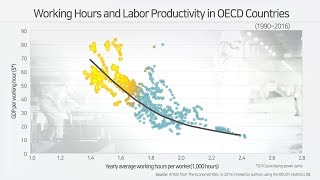Tuesday, 13 January, 2026г.
















Где искать: по сайтам Запорожской области, статьи, видео ролики
пример: покупка автомобиля в Запорожье
The Impact of a Workweek Reduction on Labor Productivity (Yoonsoo Park, WooRam Park, Fellow)
[Go to related Report]
https://goo.gl/J5G7sR
1917
World War I
There was a nationwide mobilization of labor
to produce the necessary goods for war.
And
a study was conducted on
the relationship between working hours and output
in order to maximize production.
In 2015
Economist John Pencavel
discovered new information using data collected during this period.
Output rises by the hour
but at a decreasing rate.
And, above a certain threshold, it is not sensitive to hourly changes.
The Impact of a Workweek Reduction on Labor Productivity
According to OECD statistics,
countries with shorter working hours
tend to have higher labor productivity.
In Korea’s case,
the hours are long and hence, productivity is low.
However, despite the general consensus calling for reform
of the long-hours culture prevalent in Korean society,
concerns are also being raised over the negative impact
a cutback in working hours would have on productivity.
Then, how would productivity be affected?
KDI analysed the impact of the standard 40-hour workweek,
the most recently implemented policy to reduce working hours,
on the labor productivity of 11,692 manufacturing establishments
with 10 or more employees.
The policy reduced the workweek from 44 hours to 40,
and was gradually implemented across the country
according to industry and size of establishment, from 2004 to 2011.
The results show that the reduction in the workweek
increased output per worker by 1.5%
The observed improvement of labor productivity was mainly found
in sectors that previously had long working hours.
In addition, the changes in labor productivity was not significant
before the reduction in the workweek. but became so
immediately upon the initiation of the policy.
These results suggest that the reduction “caused” the improvement
in labor productivity.
[Interview1: WooRam Park]
The results suggest that there might have been inefficiency due to the long
working hours prior to the implementation of the 40-hour workweek.
Under long working hours, a reduction in working hours will induce
improvements in labor productivity and therefore,
will not negatively affect workers’ total output and may even increase it.
[Interview2: Yoonsoo Park]
Workers’ compensation should be based on output rather than input to
encourage quicker, more efficient work practices.
In the process of reducing working hours, unnecessary work and tasks
should be eliminated, and labor and resources should be
efficiently reallocated to strengthen competitiveness.
It is also important to note that when we talk about creating jobs through
reducing working hours, it does not mean merely reducing the hours. That
is, it must be implemented in a way that strengthens productivity and
competitiveness.
Похожие видео
Мой аккаунт


 У вашего броузера проблема в совместимости с HTML5
У вашего броузера проблема в совместимости с HTML5


